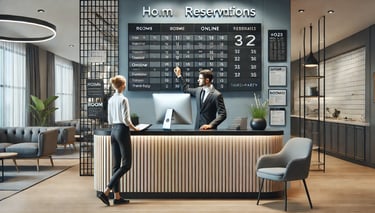Introduction to Front Office Department
The Front Office is often referred to as the "face" of a hotel, as it is the first point of contact for guests upon their arrival and plays a pivotal role in their overall experience. This department is responsible for various functions, from managing reservations and check-ins to handling guest requests and overseeing the flow of information throughout the hotel. The front office not only serves as the communication hub within the hotel but also maintains a significant role in ensuring guest satisfaction and operational efficiency. This chapter will delve into the core aspects of the Front Office Department, including its structure, roles, and functions.
1. Sections and Layout of the Front Office
The front office layout is thoughtfully designed to ensure efficient operations and exceptional guest service, with each section dedicated to specific functions:
Reception: The main service counter where guests check in and out, and can access information about their stay.
Concierge: The concierge desk offers guests assistance with transportation, sightseeing, restaurant bookings, and other personalized services.
Reservations: This area handles guest bookings, managing online and phone reservations, room assignments, and any special requests.
Cashier: The cashier desk is responsible for managing billing processes and handling payments.
Telephone Operator: Operators answer incoming calls, route them to the correct departments, and provide assistance with telephone-related guest needs.
Guest Relations: Found in some hotels, this section focuses on addressing guest concerns, ensuring satisfaction, and making guests feel welcome and appreciated.
2. Organizational Chart of the Front Office Department
The front office structure differs based on the hotel's size, with each requiring a specific organization to manage the guest volume and services offered.
Small Hotels: These hotels typically have a small team where roles overlap. A receptionist may handle tasks such as reservations, guest services, and cashiering.
Medium Hotels: In medium-sized hotels, there is usually a more defined hierarchy, which may include a Front Office Manager, Assistant Manager, receptionists, and specialized staff for reservations and cashiering.
Large Hotels: Large hotels feature a well-organized front office to accommodate the high volume of guests and bookings. The structure often includes a Front Office Manager, Duty Managers, Reception Supervisors, multiple receptionists, concierge, reservation agents, cashiers, guest relations officers, and telephone operators.
3. Duties and Responsibilities of Various Staff
Each role within the front office department has unique duties and responsibilities that contribute to the smooth running of the hotel:
Front Office Manager: Manages the entire front office department, ensuring smooth operations and guest satisfaction.
Assistant Front Office Manager: Assists the Front Office Manager and supervises daily operations, including guest complaints and staff management.
Receptionist: Greets and checks in guests, manages room keys, provides information, and ensures guest satisfaction.
Concierge: Assists guests with travel arrangements, dinner reservations, and local recommendations.
Reservation Agent: Handles room bookings, responds to inquiries, and ensures accurate room allocation.
Cashier: Manages billing processes, collects payments, and maintains accurate records.
Guest Relations Officer: Addresses guest complaints and strives to ensure guest satisfaction during their stay.
4. Attributes of Front Office Personnel
Front office personnel are the hotel's representatives and play a significant role in shaping guests' first impressions. Key attributes for front office staff include:
Communication Skills: Clear and effective communication is essential for assisting guests and handling complaints or inquiries.
Patience and Calmness: The ability to stay calm and patient, especially during peak hours or challenging situations.
Attention to Detail: Ensuring that all guest requests, bookings, and billing details are accurately managed.
Professional Appearance: Presenting a well-groomed and professional appearance enhances the hotel’s image.
Multitasking: Handling multiple tasks at once, such as answering calls, processing payments, and assisting guests, is crucial in a busy environment.
Problem-Solving Abilities: Quick thinking and adaptability are essential to resolve guest concerns efficiently.
5. Coordination of Front Office with Other Departments
To ensure smooth operations, the front office must maintain strong communication and collaboration with other departments. Coordination between teams is vital for providing exceptional guest experiences and operational effectiveness:
Housekeeping: The front office liaises with housekeeping to guarantee that rooms are clean, properly prepared, and ready for guest arrivals. Housekeeping provides regular updates on room status (e.g., "clean," "vacant clean," "out of order") and informs the front office of any special guest requests or maintenance concerns in guest rooms. They also share any guest preferences, such as extra bedding or specific room arrangements, ensuring personalized service.
Food and Beverage: The front office works with the food and beverage (F&B) department to manage dining needs, including restaurant reservations, in-room service orders, and dietary restrictions. They communicate any special guest requirements, such as food allergies, to the F&B team. Additionally, the F&B department informs the front office of available dining options, special events, or unique culinary offerings, allowing the front office to assist guests in making informed dining decisions.
Maintenance: The front office collaborates with the maintenance department to resolve any issues reported by guests, such as malfunctioning air conditioning, plumbing problems, or broken amenities. The front office contacts maintenance for immediate repair needs and also works with them to ensure preventive maintenance is carried out to avoid disruptions during a guest's stay.
Sales and Marketing: The front office coordinates with the sales and marketing teams to share information about special promotions, events, or seasonal offers that guests might be interested in. Sales and marketing provide updated promotional materials and event schedules, which the front office can use to upsell packages or offers during check-in. The front office also relays guest feedback to sales and marketing, helping refine future campaigns.
Accounting: The front office works with accounting to ensure accurate billing and payment processing for guests. The front office communicates guest payment methods (e.g., credit card, cash) and resolves any billing discrepancies. Accounting ensures that all charges are correctly posted to the guest’s account, including room rates, taxes, dining charges, and additional services. They also keep the front office informed about financial reports or audits that may impact guest transactions.
Security: The front office coordinates with the security department to safeguard the well-being of guests. This includes monitoring security alerts, handling emergencies, and keeping track of guest movements, especially in high-security areas. The front office shares relevant information with security regarding guest requests for additional safety measures. Security updates regarding property safety are crucial for the front office to address any potential issues promptly.
6. Equipment Used in the Front Office (Manual and Automated)
The front office utilizes various types of equipment, both manual and automated, to enhance efficiency and streamline processes.
Manual Equipment: Includes essential items such as room racks, registration cards, guest folios, and key holders that help manage guest records and room assignments.
Automated Equipment: Modern front offices use technology like Property Management Systems (PMS), card key encoders, telephone consoles, and point-of-sale (POS) systems to speed up processes and ensure accuracy in guest services.
Key Terms
Concierge: A specialized front office role that assists guests with external services, such as transportation and dining recommendations.
Front Office Manager: The individual responsible for overseeing the entire front office team and ensuring service quality.
Reservation Agent: Staff who manage room bookings and guest inquiries, both onlinand over the phone.
Property Management System (PMS): Software used to manage various front office functions, including reservations, billing, and guest records.
Housekeeping Coordination: Communication between front office and housekeeping to ensure room readiness.
Guest Relations: A section dedicated to enhancing guest satisfaction and addressing complaints.
Point-of-Sale (POS) System: An electronic system for processing guest transactions within the hotel.
www.ehospitalitystudiess.com


FRONT OFFICE







